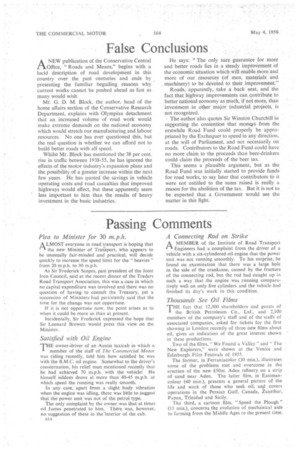False Conclusions
Page 48

If you've noticed an error in this article please click here to report it so we can fix it.
ANEW publication of the Conservative Central Office, "Roads and Means," begins with a lucid description of road development in this country over the past centuries and ends by presenting the familiar beguiling reasons why current works cannot be pushed ahead as fast as many would wish.
Mr. G. D. M. Block, the author, head of the home affairs section of the Conservative Research Department, explains with Olympian detachment that an increased volume of road work would make extreme demands on the national economy which would stretch our manufacturing and labour resources. No one has ever questioned this, but the real question is whether we can afford not to build better roads with all speed.
Whilst Mr. Block has mentioned the 38 per cent. rise in traffic between 1938-55, he has ignored the effects of the motor industry's expansion plans and the possibility of a greater increase within the next few years. .He has quoted the savings in vehicle operating costs and road casualties that improved highways would effect, but these apparently seem less important to him than the results of heavy investment in the basic industries. He says: "The only sure guarantee for more and better roads lies in a steady improvement of the economic situation which will enable more and more of our resources (of men, materials and machinery) to be devoted to their improvement."
Roads, apparently, take a back seat, and the fact that highway improvements can contribute to better national economy as much, if not more, than investment In other major industrial projects, is not recognized.
The author also quotes Sir Winston Churchill in supporting the contention that moneys from the erstwhile Road Fund could properly be appropriated by the Exchequer to spend in any direction, at the will of Parliament, and not necessarily on roads. Contributors to the Rom! Fund could have no more claim to the proceeds than beer-drinkers could claim the proceeds of the beer tax.
This seems a plausible argument, but as the Road Fund was initially started to provide funds for road works, to say later that contributors to it were not entitled to the sums raised is really a reason for the abolition of the tax. But it is not to be expected that a Government would see the matter in this light.




































































































































